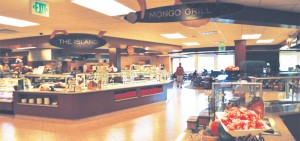
The quality of dining services is certainly a contributing factor to the overall college experience and many schools, such as Bowdoin College in Brunswick, Maine are taking this seriously. Bowdoin’s cafeterias are among the top-ranked in the nation and offer a variety of locally grown produce including food from the college’s organic garden. Compare this to some smaller schools that contract out their entire dining operation to independent catering companies.
Traditionally the idea of a college cafeteria evokes grandiose expectations of comfort food, large desserts, sugary drinks and any other contributing agent to the feared “freshman fifteen.” Most cafeterias easily meet these expectations, but in an increasingly health-conscious society, more Universities are looking to meet the demands of students trying to maintain good nutrition. Public interest in healthier lifestyles is growing rapidly. Google trends show that the word “vegan” is being searched today at more than twice the rate it was in 2005.
Here at Ferris, students can find a wealth of food options in The Rock and Westside Cafés including health-friendly dishes and classicly beloved junk food. In 2010, dining services teamed up with student government to elicit feedback from vegetarian and vegan students about what could be improved upon in the cafeterias. Since then, more vegan/vegetarian friendly menu items are being served, including the “Healthy U” initiative that provides dishes lower in calories and fat.
In addition to these healthy menu items, one can maintain a reasonably nutritious diet by monitoring portions and variety in food groups. Both Ferris cafeterias always have a selection of fruits and vegetables; grabbing for these at snack and meal time as opposed to fried foods is merely an exercise of will-power.
Ferris offers a pool of resources to students seeking advice for healthy living at ferris.edu/dining. Dubbed the “Nutri-Choice Program,” Ferris dining staff and Registered Dietitian Brenda Walton aim to teach healthy eating habits and encourage more physical activity. “Now and then,” the site reads, “we need to take an honest look at our eating habits.”
